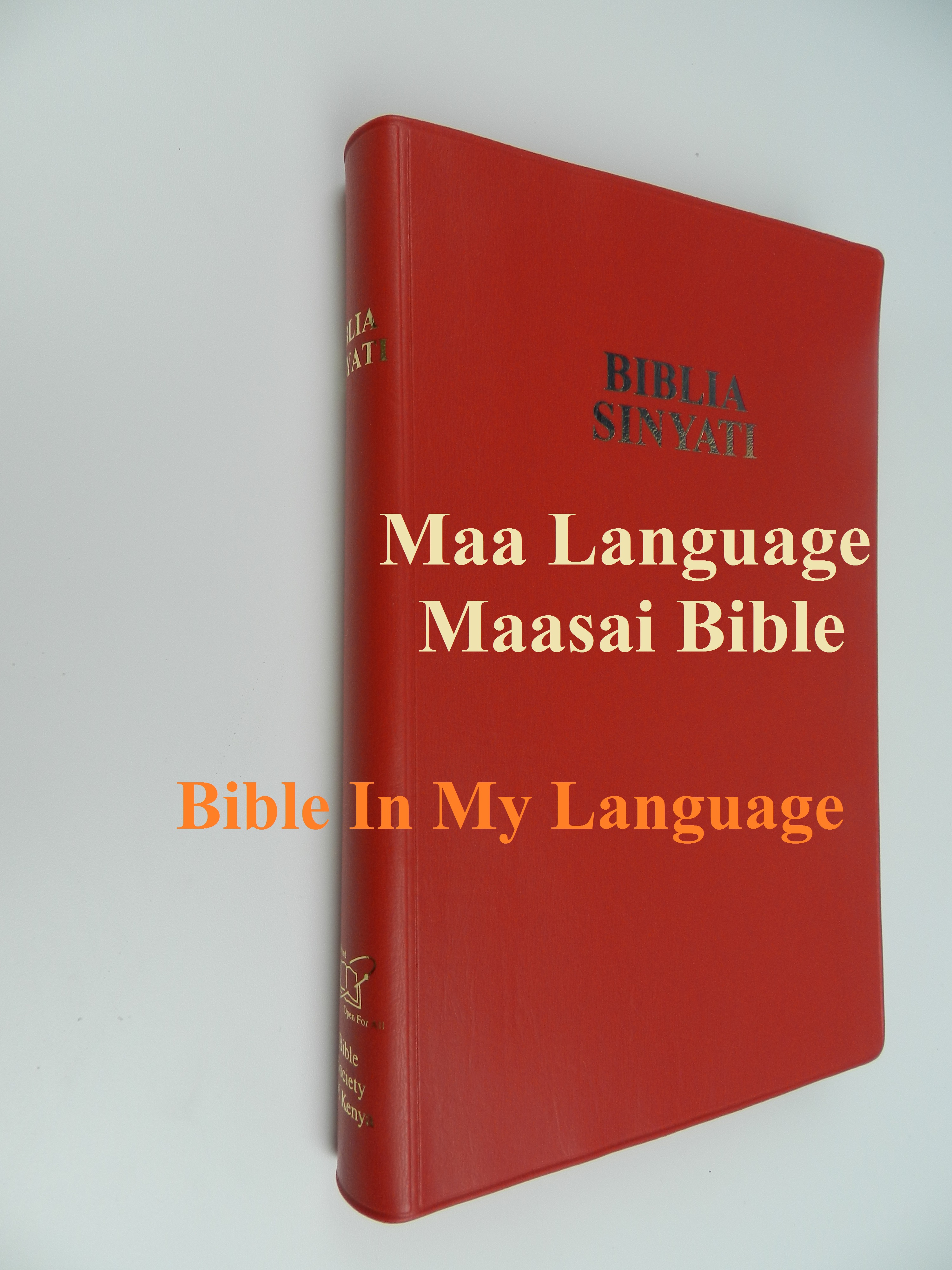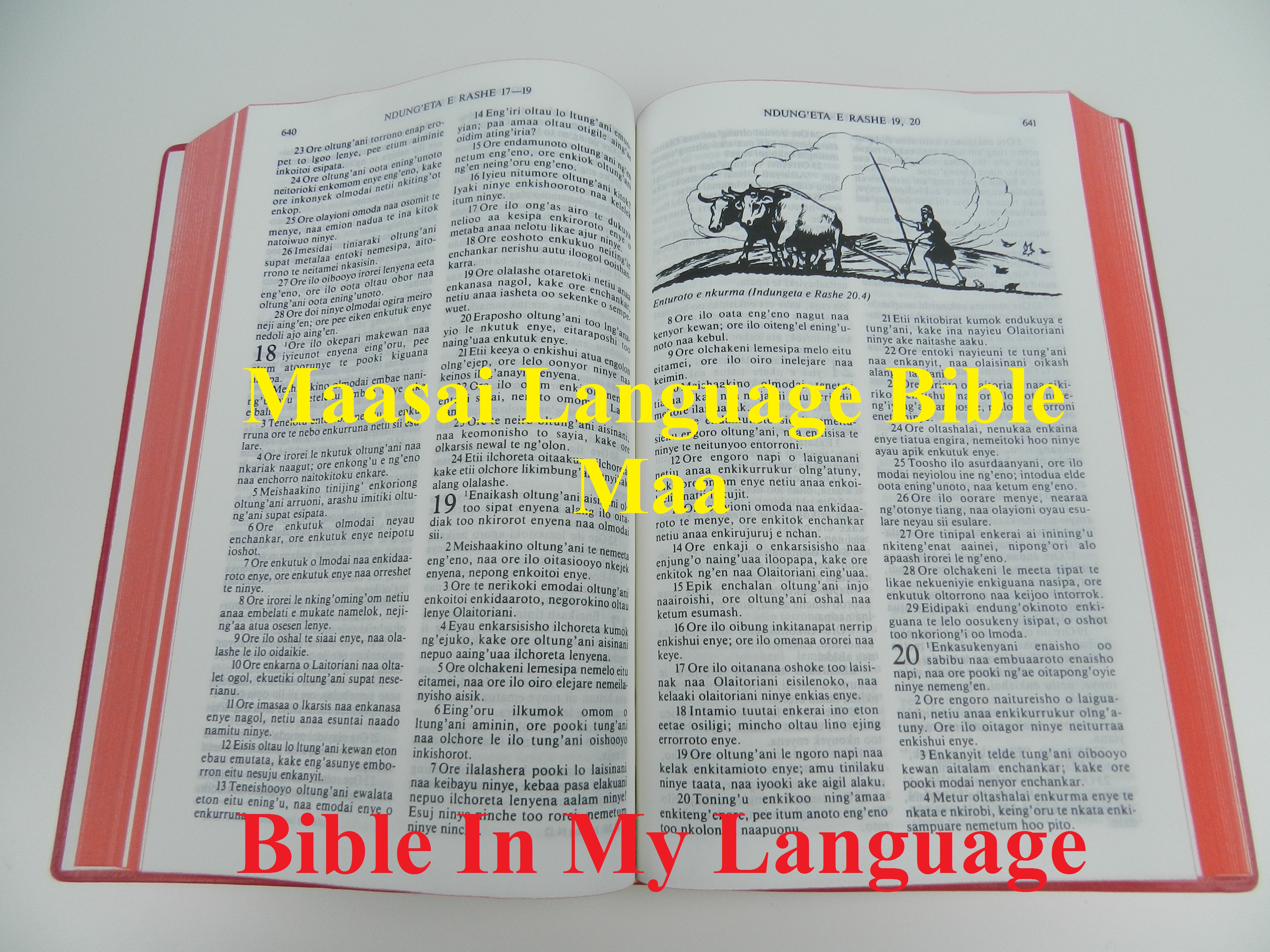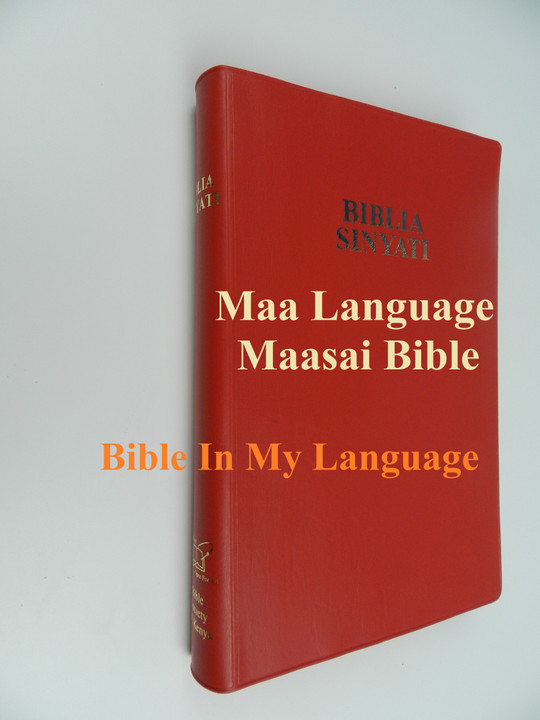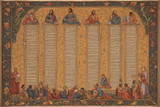Massai language bible for the Maa speaking people in Kenya and Tanzania. Beautiful Vinyl Bound Bible with Red Edges 52 Size. Biblia Sinyati meaning Holy Bible. Read and be encouraged about these sepcial people and their language.
We are pleased to announce the arrival of a new shipment of Maasai Language Bibles / Maa Bibles
Size 052P Red Vinyl Red Edges / Biblia Sinyati
15,000 Printed in 2014
The Maa speaking people are to be found in a very wide territory spreading from northern Kenya and extending as far south as the central areas of Tanzania.
The Maasai, Masai or Maa language is a member of the East Niolitic branch of the Nilo-Saharan language family spoken by about 900,000 people in southern Kenya and northern Tanzania. The termMaasairefers to "one who speaks the Maa language".

Available for purchase here:
https://www.amazon.com/Maasai-Language-Bible-Bibli...
SAMPLE PAGE IMAGE:

EXPERIENCE THE MAA LANGUAGE:
Maasai or Masai (English pronunciation:/ˈmɑːsaɪ/; autonym: ɔl Maa) is an Eastern Nilotic language spoken in Southern Kenya and Northern Tanzania by the Maasai people, numbering about 800,000. It is closely related to the other Maa varieties: Samburu (or Sampur), the language of the Samburu people of central Kenya,Chamus, spoken south and southeast of Lake Baringo (sometimes regarded as a dialect of Samburu); and Parakuyu of Tanzania. The Maasai, Samburu, il-Chamus and Parakuyu peoples are historically related and all refer to their language asɔl Maa.
The Maasai are a famous community in East Africa recognized for preserving their unique culture and way of life. Many tourists visit the areas where they live to witness and learn about their culture. The Maasai are proudly pastoralist and many continue with their nomadic pastoralist lifestyle which they have practiced for many generations.
The Maa speaking people are to be found in a very wide territory spreading from northern Kenya and extending as far south as the central areas of Tanzania. Certainly, a language spread this wide and lacking the means for maintenance of linguistic uniformity or standardization must contend itself with dialectal variation, a fact which is necessitating the need to revise the current Maasai Bible which was released in 1992. This translation, which was started mainly through the initiatives of John T. Mpaayei, the then General Secretary of the Bible Society of East Africa, and the local Maasai churches in Kajiado and Narok, was prepared along the lines of ‘union version’ translation. It was intended for use among all Maasai speaking peoples in Kenya and Tanzania. Indeed an attempt was made to involve, at least on the translation review committee, individuals representing the different Maasai dialect areas of Kenya and Tanzania, from the Samburu in the north to the Parakuyo in the South.
INTERESTING FACTS:
• Maasai do not eat meat on the day they have eaten milk or dairy products.
• Maasai have legends similar to the stories of Samson and Delilah, Isaac and Jacob, David and Goliath.
• Maasai worship one diety or God called Enkai. They worshiped him directly and also though sacrifices.
• Maasai do not eat meat with blood. They always pour/drain the blood from the animal. Blood drinking was not original part of their culture.
• Maasai have male circumcision as part of their culture.
• Their physical body structure resemble those of the Jews. Their warriors were known for their bravery!
INTERESTING ARTICLE TO READ ABOUT THE MAASAI:
http://globaltravelauthors.com/2014/01/01/masai-th...
Links
Information about the Maasai language and peoples
http://www.uoregon.edu/~maasai
http://en.wikipedia.org/wiki/Maasai_language
http://www.laleyio.com/maasai.html
Online Maa (Maasai) dictionary
http://darkwing.uoregon.edu/~maasai/Maa Language/matext.htm
Nilo-Saharan languages:
Acholi,Alur,Bari,Dholuo,Dinka,Kanuri,Karamojong,Maasai,Nuer,Shilluk,Zarma
Follow us on FACEBOOK:
https://www.facebook.com/BibleInMyLanguage/
Explore Popular Articles
A Tapestry of Scriptures: Discovering Diverse Bibles from Around the World
A Tapestry of Scriptures: Discovering Diverse Bibles from Around the WorldIn a quiet corner of the...
A Tapestry of Devotion - Diverse Bibles for a Global Congregation
A Tapestry of Devotion - Diverse Bibles for a Global CongregationIn a world rich with cultural and l...
Unveiling the Sacred: A Literary Journey Through BIML's Hungarian Bibles
Unveiling the Sacred: A Literary Journey Through BIML's Hungarian BiblesIn the vast mosaic of langua...
An Ode to the Sacred Texts: A Multilingual Journey Through the Bible's Many Tongues
An Ode to the Sacred Texts: A Multilingual Journey Through the Bible's Many TonguesIn the great tape...
Exploring Scripture Across Cultures: The Beauty of Multilingual Bibles
Exploring Scripture Across Cultures: The Beauty of Multilingual BiblesIn a world brimming with a m...
The Profound Resonance of Multilingual Bibles: A Tapestry of Faith Across Languages
The Profound Resonance of Multilingual Bibles: A Tapestry of Faith Across LanguagesIn the intricate...







